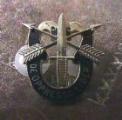Something was missing in this forum, and now I know what: A "How to avoid cutting yourself" thread. Discussing knifes, knife combat techniques and bandages is fine, but it's better to not cut yourself in the first place.
I called this "avoidance" of small wars for a reason; there will likely always be conflicts. The question is about how to not stick your head too much into the dangerous mess of other people.
Some countries can resist such urges better than others, maybe the more self-controlled ones who can resist such urges and thus did not suffer much harm from small wars do something right?
What's the difference between a country that's believing it needs to be involved in distant, foreign and quite often totally irrelevant conflicts and a country that's cool?
I'm fully aware that there are many ideas (I call them "myths") about how sticking your head into distant conflicts somehow keeps the world from exploding or something, but the history of the last decade should have told even those myth-believers that involvement is akin to self-mutilation.
# What does it take to motivate a country to intervene military in distant places without clear national interests (economical, political obligations) to outweight the costs?
# What does it take to counter these motivations?
# Can institutional safeguards help or is it all about political culture and special interests?
# How can a principal-agent problem ('chickenhawks in government') be avoided?
# Do any countries have effective legal counterweights to political aggressiveness (such as conscription of sons of politicians into front-line infantry?)
# What's the role of mass media? Can feeding the media with interestign stories keep them from pushing for war (intentionally or indirectly) because of a lack of good alternative media contents?













Bookmarks